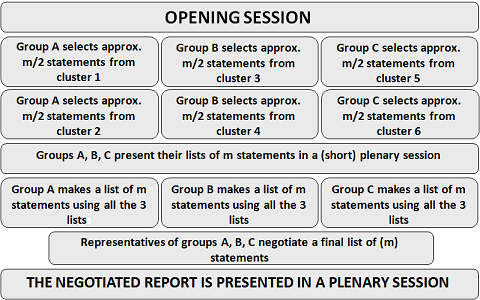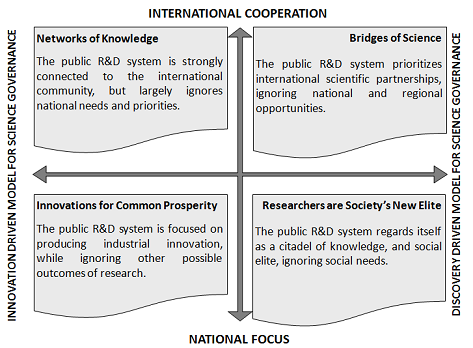Vision of the Crowds
From FORwiki
| Project Visions and Visioning | |
|---|---|
| | This article is developed within the scope of the Project Visions and Visioning, an effort to enhance Foresight learning through collaborative work. |
Vision of the Crowds is the forth lecture from a module on Visions and Visioning, first taught to graduate students from the Communication Faculty of the National School for Political and Administration Studies (Romania).
Contents |
Proiectus (latin)
perfect passive participle of proicio from pro (“from, in the place of; for”) + ioacio (“throw, hurl”) I send forth, emit I bring forth, produce
Participatory Models
consensus conference
a public meeting, which allows ordinary citizens to be involved in the assessment of technology - a dialogue between experts and citizens, open to the public and the media consensus on attitudes and recommendations is achieved through open discussion the conference provides politicians with information, which they normally do not have, either from the media nor from the experts themselves – there are limitations of expert knowledge and biases involved in experts’ assessment
actors
the citizen panel plays the leading role it consists of about 14 people who are introduced to the topic by a professional facilitator formulates the questions to be taken up at the conference participates in the selection of experts to answer them has two weekends for this preparation the expert panel selected in a way that ensures that essential opposing views and professional conflicts can emerge and be discussed at the conference good experts, open-minded, good communicators, with an overview of their field advisory committee makes sure that all rules of a democratic, fair and transparent process have been followed
script
day 1 - experts present their answers to the questions from the citizen panel, from the point of view of their field of expertise day 2 – morning: clarifying questions and discussions between the expert panel, the citizen panel and the audience; - afternoon: the citizen panel works on a final document, presenting their conclusions and recommendations day 3 - the citizen panel prepares the final document day 4 - the citizen panel reads the final document to experts and audience, including the press experts have the opportunity to correct misunderstandings and factual errors, but at this point they are not allowed to influence the views of the citizen panel
consensus
only relevant in relation to that envisaged among the members of the citizen panel concerning the selection and formulation of main questions to be asked of the experts (i.e. the agenda for the whole conference) concerning conclusions and recommendations in the final document these are the decisive steps - the points when the panel is confronted with the outside world: press, experts, audience and so on sometimes the consesual conclusions are controversial according to other groups in society in all consensus conferences there have also been moments of conflict and sometimes negotiations until late in the night regarding one or more recommendations
negotiation workshop
objective to select m statements, balanced among k categories, from a larger set of n visionary statements (m<n) on the final list of m statements there should be statements from each one of the k categories preliminaries a large number of statements about the future are collected through interviews and on-line surveys they are grouped and merged into n visionary statements, and the n visionary statements are further grouped into k clusters participants 60-100 citizens, representing a diversity of societal actors: research system, policy-makers, public administration, private interests, civic society.
script
organizers are forming k/2 heterogeneous groups, including participants with diverse affiliations groups are created according to each participant's interest for the topics of two clusters from the total of k clusters. groups select approximately m/2 statements from each one of the two clusters they are analyzing - at the end of the first session, each group will identify a list of m visionary statements from the two clusters representatives of each group present their selected list in a short plenary session. each group analyzes the lists selected by other groups, identifies possible trade-offs, and proposes an alternative for the final list of m statements representatives of each group negotiate the final list of m statements the final list is presented during a short plenary session
lessons
the script is based on a negotiation formula that proved its efectiveness in international negotiations consequently, it is not intuitive and quite difficult to implement quality facilitation during group meetings is a must
scenario workshop
starts with a problem looking for solutions - technological, regulatory or maybe a new way of organising and managing certain problems is a local meeting that includes dialogue among four local groups of actors: policy-makers, business representatives, experts and citizens participants carry out assessments of technological and non-technological solutions to the problems, and develop visions for future solutions and proposals for realising them
script
before the workshop can take place, a set of scenarios is written, describing alternative ways of solving the problem they have to be different with respect to both the technical and organisational solutions described and the social and political values embedded in them in the workshop, the scenarios are used as an inspiration in the process participants are asked to criticise and comment to enable them to develop visions of their own the workshop process may last for one or two days three principal steps to comment and criticise the scenarios by pointing out barriers to realising the visions; to develop the participants’ own visions and proposals; to develop plans of action
incasting
Goal: Elaborate fixed, multiple scenarios Characteristics: Easiest for client/audience participation because scenario kernels/logics are done for them Provides in-depth elaboration of alternative scenarios Generic scenario kernels/logics might not be relevant to client/audience; therefore less buy-in Many have an intuitive sense of the best-case and worst-case scenarios already; filling in the cells of the matrix with many rows (domains/issues) might become tedious
script
Participants, possibly divided into small groups, read a paragraph that describes a rather extreme version of an alternative future. Examples would be: A Romanian R&D system that is strongly connected to the international community, but ignoring national needs and priorities A Romanian R&D system that is focused on innovation, and the creation of wealth A Romanian R&D system that prioritizes social needs, largely ignoring international cooperation if it does not answer those needs A Romanian R&D system that sees itself as a citadel of knowledge, and a social elite Participants are asked to describe the impact of such futures on a series of issues, such as the research infrastructure, the development of human resources, or the science governance model



